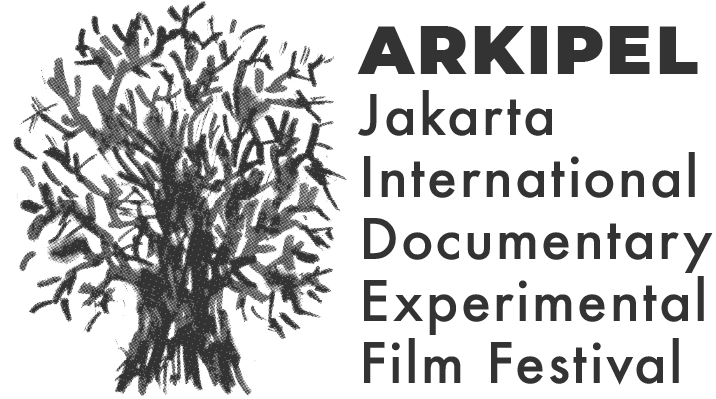Menjangkau ‘Vietnam‘ dari Hanoi DocLab: Catatan tentang Penayangan Filem di Program Presentasi Spesial 02 – Hanoi DocLab
Senin sore, tanggal 21 Agustus 2017, saya berkesempatan menghadiri penayangan filem-filem di program Presentasi Spesial ARKIPEL di Kineforum. Karena masih terlalu cepat 30 menit sebelum presentasi spesial ini dimulai, saya mengintip filem-filem apa saja yang akan ditayangkan pada program yang saya ikuti ini di katalog ARKIPEL.
Presentasi spesial hari itu bertajuk “Pribadi dan kolektif: Scene Filem Eksperimental dari Hanoi”, dikurasi oleh Nguyen Trinh Thi, pendiri Hanoi DocLab sekaligus seorang seniman dari Vietnam. Enam filem yang ditayangkan semuanya berasal dari negara yang sama dengan Thi. Sambil masih membaca deskripsi singkat masing-masing filem, saya tidak menyadari kalau Thi sudah tiba di Kineforum. Thi kemudian disambut dengan hangat oleh Anggraeni Widhiasih (anggota Forum Lenteng sekaligus panelis di Forum Festival Panel I) dan Yuki Aditya (Direktur Festival) yang juga akan ikut hadir sore itu.

Nguyen Trinh Thi (kiri) dan Yuki Aditya (kanan).
Tak lama kemudian, saya bersama dengan 38 penonton lainnya dipersilakan untuk duduk di kursi yang sudah tersedia di dalam Kineforum. Setelah semua menempati kursinya masing-masing, Yuki membuka program ini sekaligus memperkenalkan Thi. “Terima kasih, Yuki!” jawab Thi dalam Bahasa Inggris setelah Yuki meminta Thi agar ia menyampaikan kata pengantar di program kali ini dan memperkenalkan sedikit mengenai Hanoi DocLab. “Terima kasih sudah hadir di sini,” ujar Thi lagi. “DocLab didirikan pada tahun 2009, sudah 8 tahun berdiri…”
Ringkasnya, menurut penjelasan Thi, Hanoi DocLab berfokus pada melatih dan melestarikan kreativitas lokal dan pemikiran independen, sejak awal didirikan. Selain itu, lembaga tersebut juga sering mengadakan pemutaran mingguan untuk filem dokumenter dan eksperimental, mengadakan kursus dan lokakarya membuat filem, perpustakaan video, dan fasilitas editing yang dapat diakses publik. “Salah satu filem yang akan diputar ini diproduksi langsung saat lokakarya,” cerita Thi yang didengarkan secara serius oleh seisi bioskop kecil Kineforum. “Dan filem lainnya dibuat oleh anggota yang sudah pernah mengikuti lokakarya dari DocLab.”
Setelah Thi selesai memberikan sambutan, filem pun dimulai. Filem pertama berjudul Bad Luck of the House Construction (2017) karya Ta Minh Duc. Filem berdurasi 2,5 menit ini membuat penonton terfokus pada dua ekor ayam yang sedang bertengkar di atas tanah lapang dengan pohon-pohon yang mati. Terdapat pula sebuah tandem roller yang lalu-lalang bergerak maju dan mundur di belakang dua ekor ayam tersebut untuk meratakan tanah.
Setelahnya, filem kedua berjudul Water Dream (2016). Sesuai dengan judulnya, karya Nguyen Hai Yen ini menonjolkan air sebagai elemen utamanya. Filem berdurasi 6 menit ini memberikan kesan ‘tenang’ saat manusia sedang menyatu dengan air.
Masih dengan kesan tenang di filem kedua, saya dikejutkan dengan filem ketiga yang berjudul TV (2013) karya Khong Viet Bach. Menit-menit pertama filem menampilkan seorang laki-laki (Khong Viet Bach itu sendiri) yang sedang berdiri tanpa ekspresi dari raut wajahnya. Sebagai latar, diputar channel televisi, mulai dari program berita, iklan parfum, lagu kebangsaan Vietnam dan sinema elektronik, merepresentasikan penonton yang sedang menonton program-program televisi yang terus berganti itu. Wajah tanpa ekpresi itu kemudian muncul di televisi-televisi masyarakat, seakan-akan mengkritik citra diri maupun tayangan televisi yang diproduksi oleh kekuasaan. Ada yang menontonnya, namun banyak juga yang mengacuhkannya.
Puas dengan filem ketiga, Memory of the Blind Elephant (2016) karya Nguyen Phuong Linh menjadi filem selanjutnya di rangkaian filem hasil kurasi Thi yang diputar. Kegelapan tiba-tiba muncul di layar, menemani gelap dan dinginnya Kineforum. Kemudian cahaya muncul dari senter yang seakan mengajak penonton untuk melihat apa yang disorot oleh senter. Pohon karet, manusia, hewan, dan alam seakan menjadi saksi bisu berubahnya keadaan di lingkungan sekitar.
Setelah filem keempat selesai, saya berharap saya akan menikmati filem Untitled (2017) karya Thinh Nguyen. Namun yang saya dapati justru hanyalah kebingungan, karena filem selanjutnya yang ditayangkan berbeda dari deskripsi di katalog ARKIPEL, yang seharusnya mengenai penduduk desa yang dipaksa hengkang dari tanah mereka beberapa tahun lalu. Thi, yang duduk persis di depan saya, terlihat berbisik dengan Yuki yang berada di sebelahnya.



George Clark, salah satu kurator ARKIPEL Penal Colony, memberikan pendapat terhadap kuratorial hari itu.
Filem berikutnya menjadi filem terakhir yang ditayangkan di program sore ini. Filem karya Nguyen Trinh Thi berjudul Eleven Men (2016). Filem ini merupakan gabungan dari adegan-adegan berbagai filem yang diperankan oleh aktris yang sudah berkarir selama tiga dekade di Vietnam, yaitu Nhu Quynh. Selain potongan adegan-adegan dari filem tahun 1966 sampai 2000 yang disatukan menjadi rangkaian itu, terdapat pula sebuah narasi dari suara wanita (suara Thi). “Saya memiliki sebelas pria” adalah pernyataan pertama yang memulai filem itu dan mengingatkan saya pada cerita pendek karya Franz Kafka tahun 1919 yang dimulai dengan deklarasi seorang ayah “Ich habe elf Söhne (Saya memiliki sebelas anak laki-laki).” Dan rupanya tebakan saya benar. Teks filem diadaptasi dari “Elf Söhne”, mendeskripsikan secara detail yang akut dan ironis dari kesebelas pria yang dimiliki oleh seorang wanita.
Di akhir program, seorang penonton mengajukan pertanyaan, apakah aktris dalam filem itu sudah menonton filem yang dibuat Thi ini. Menanggapi hal itu, Thi mengatakan kalau aktris itu belum menontonnya dan Thi malah takut kalau ia tidak menyukainya. “Di Vietnam, membicarakan sejarah merupakan hal yang sensitif,” ujar Thi dan kemudian terjadi sebuah jeda pendek sebelum Thi menutup program sore ini. ***
Reaching for ‘Vietnam‘ through Hanoi DocLab: Notes on Film Screening Program in the Special Presentation Program 02 – Hanoi DocLab
Monday afternoon, August 21, 2017, I had the opportunity to attend the film screening of ARKIPEL Special Presentation program at Kineforum. Since it was still 30 minutes before this special presentation began, I took a look at the films that would be screened on the program I attended from the ARKIPEL catalogue.
The special presentation that day was entitled “The Personal and The Collective: Experimental Film Scene from Hanoi”, curated by Nguyen Trinh Thi, founder of Hanoi DocLab and an artist from Vietnam. The six films screened are all from the same country as Thi. While still reading the short descriptions of each film, I did not realize that Thi had arrived at Kineforum. Thi was warmly welcomed by Anggraeni Widhiasih (member of Forum Lenteng as well as panelist at Panel 1 of Festival Forum) and Yuki Aditya (Festival Director of ARKIPEL) who will also attend the screening that afternoon.



Nguyen Trinh Thi.
Shortly thereafter, I along with 38 other audiences were invited to sit on the chairs provided inside the Kineforum. After everyone got their seats, Yuki opened this program while introducing Thi. “Thank you, Yuki!” Thi replied in English after Yuki asked for her to deliver the introductory word on this program and also introduce a little about Hanoi DocLab. “Thank you for coming here,” Thi said again. “DocLab was founded in 2009, already 8 years standing …”
In summary, according to Thi’s explanation, Hanoi DocLab focuses on giving workshops and preserving local creativity and independent thinking, since it was founded. In addition, the institute also often holds weekly screenings for documentary and experimental films, conducts courses and workshops to make films, video libraries, and editing facilities accessible to the public. “One of the films that will be screened is produced live at the workshop,” said Thi and was listened seriously by the entire aundiences of the small Kineforum cinema. “And other films are made by members who have already attended a workshop from DocLab.”
After Thi finished giving her introduction, the film started. The first film was entitled Bad Luck of the House Construction (2017) by Ta Minh Duc. This 2.5 minutes film kept the audiences focused on two chickens who are fighting over a field with dead trees. There is also a tandem roller moving back and forth flattening the ground behind the two chickens .
Afterwards, the second film was entitled Water Dream (2016). In accordance with the title, the work of Nguyen Hai Yen features water as its main element. This 6 minute film gave the impression of ‘calm’ when humans are merging with water.
Still with the calm impression on the second film, I was struck by the third film entitled TV (2013) by Khong Viet Bach. The first minutes of the film featured a man (Khong Viet Bach himself) who was standing expressionless from the look on his face. For the backdrop, the television channels, ranging from news programs, perfume ads, Vietnamese national anthems and electronic cinema, represent the audience watching the continuously changing television programs. The expressionless face then appeared on the public television, as if to criticize the self-image and television shows produced by power. Some are watching it, but many are ignoring it.
Satisfied with the third film, Memory of the Blind Elephant (2016) by Nguyen Phuong Linh became the next film in the series of curated films that Thi screened. Darkness suddenly appeared on the screen, accompanying the dark and cold Kineforum. Then the light emerged from the flashlight that invited the audiences to see what the flashlight was highlighting. Rubber trees, humans, animals, and nature seemed to be the silent witnesses of changing circumstances in the surrounding environment.



George Clark, one of the curators for ARKIPEL Penal Colony.
After the fourth film was over, I hope I will enjoy the film called Untitled (2017) by Thinh Nguyen. But what I found was just confusion, because the next film screened was different from the description in the ARKIPEL catalogue, which should be about the villagers who were forced to leave their land a few years ago. Thi, who sat right in front of me, was seen whispering to Yuki who was next to her.
The next film became the last film screened on the program this afternoon. Film by Nguyen Trinh Thi entitled Eleven Men (2016). This film is a composite of footages from various films played by actress who has a career for three decades in Vietnam, namely Nhu Quynh. Aside of footages from the films from 1966 to 2000 which were incorporated into that series, there is also a narration from female voice (Thi’s voice). “I have eleven men” was the first statement that started the film and reminded me of a short story by Franz Kafka in 1919 which began with the declaration of a father “Ich habe elf Söhne (I have eleven sons).” And apparently my guess was correct. The film text was adapted from “Elf Söhne”, describing in acute and ironic details of the eleven men possessed by a woman.
At the end of the program, an audience asked question whether the actress in the film has watched this film made by Thi. Responding to that, Thi said that the actress has not watched it yet and Thi is even fear that she would not like it. “In Vietnam, discussing history is sensitive,” said Thi and then there was a short pause before Thi closed the program this afternoon. ***







